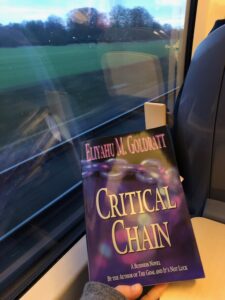 My guess is this book has been standing unread in my bookshelf for the better part of 12-13 years or so. Possibly even longer, who knows. (Imagine if books could tell their stories? I mean, the individual book: Oh yeah, I remember the day she picked me up at the bookstore and brought me home, I was so thrilled, but honestly, I’ve been feeling extremely neglected for the better part of 1,5 decade…) The book in question is Critical chain by Eliyahu M. Goldratt.
My guess is this book has been standing unread in my bookshelf for the better part of 12-13 years or so. Possibly even longer, who knows. (Imagine if books could tell their stories? I mean, the individual book: Oh yeah, I remember the day she picked me up at the bookstore and brought me home, I was so thrilled, but honestly, I’ve been feeling extremely neglected for the better part of 1,5 decade…) The book in question is Critical chain by Eliyahu M. Goldratt.
Being involved in a project building a manufacturing site for pharma, the book called out to me when it was time to pick my 12 + 12 books. Had I not had this current project top of mind, it would likely have stayed on the bookshelf for another decade or so.
Reading it, I’ve underlined several passages directly relating to my project managing quandaries du jour, but none of that is especially interesting outside the scope of project management. However, there’s this one passage that directly relates to another one of my current ventures, the most-likely-or-at-least-hopefully-soon-to-be-released-podcast-adventure I am on with Caspian and Dominic.
“Presenting a problem as a conflict between two necessary conditions makes a lot of sense. But I was almost programmed to proceed to find a compromise. In academia we don’t call it compromise, we call it optimize. Three-quarters of my articles are optimization models of some kind. You can imagine how difficult it was for me to accept that a much better solution, or even solutions, emerge by refusing to attempt to find a compromise, and instead concentrating on exposing the underlying assumptions.”
The I of the quote is Johnny Fisher, a professor at a university, in this fictionalized business/project management-skills book. If you’ve read The monk who sold his Ferrari by Robin Sharma, you know the type of book this is. If you haven’t, well, basically it’s a novel teaching a specific project management skill.
Concentrating on exposing the underlying assumptions.
That sentence jumps out at me, almost punching me in the nose with its insistent underlying message. For many years, and many times, I’ve said that assumptions are the mother of all fuck-ups, and so far I’ve yet to be proven wrong. And at the same time, assumptions can be so sly, so cunning, undercover bordering on stealth-like, elusive as a unicorn, because what they point to is my personal truths. And those just are. I don’t question them. I am rarely aware of them, they just are. So how, then, to expose them? Perhaps in different words, but still, that’s one thing we are looking at in the podcast-adventure.
The book I am blogging about is part of the book-reading challenge I’ve set for myself during 2020, to read and blog monthly about 12 Swedish and 12 English books, books that I already own.
Det är superintressant att liksom syna sina värderingar. När jag gör det ser jag att många av dem inte ens är mina egna, utan att jag har ärvt dem från tidigare generationer.
Mmm. Det är det där med arv ja. Och om man aldrig synar dem, nyfiken lyfter på stock och sent, så får man ju inte syn på dem.